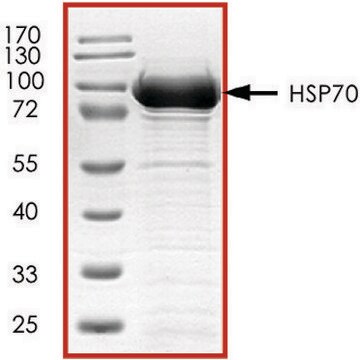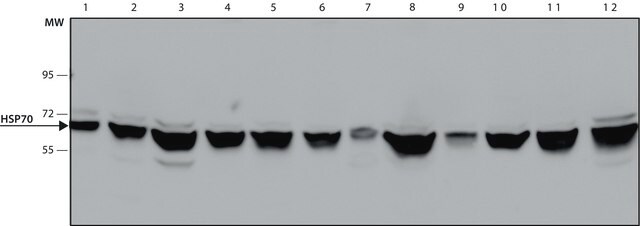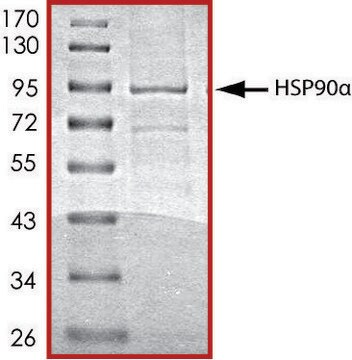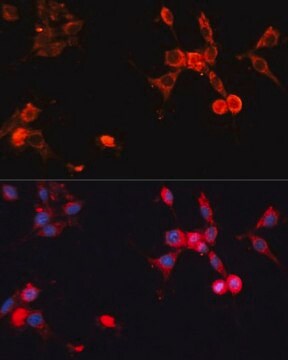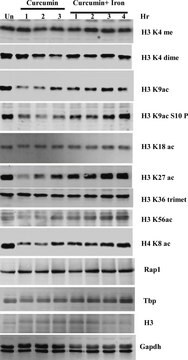추천 제품
생물학적 소스
human
재조합
expressed in baculovirus infected Sf9 cells
분석
≥70% (SDS-PAGE)
양식
buffered aqueous glycerol solution
분자량
~70 kDa
NCBI 수납 번호
응용 분야
cell analysis
배송 상태
dry ice
저장 온도
−70°C
유전자 정보
human ... HSPA1A(3303)
일반 설명
Heat shock protein 70 (HSP70) is a ubiquitous molecular chaperone. It comprises an N-terminal domain, nucleotide-binding domain (NBD), substrate-binding domain (SBD), and a C-terminal domain.
애플리케이션
Heat shock protein 70 (HSP70), His tagged human has been used:
- to study the interaction between HSP70 and receptor of advanced glycation endproducts (RAGE) using protein proximity ligand assay (PLA)
- to facilitate the import of superoxide dismutase 2 (SOD2) into the mitochondria
- to study its role in muscle catabolism
생화학적/생리학적 작용
Heat shock protein 70 (HSP70) plays a role in the cellular protein folding and remodeling process. It is also involved in the translocation of polypeptides into the chloroplast, mitochondria, and endoplasmic reticulum. HSP70 facilitates dismantling of protein complexes and modulates protein activity. It also plays a role in guarding cells from proteotoxic stress, pathophysiological conditions, and organismal aging. HSP70 participates in the activation of several immune cells such as macrophages, natural killer (NK) cells, B lymphocytes, peripheral monocytes, and antigen-presenting cells (APCs).
물리적 형태
Supplied in 50mM sodium phosphate, pH 7.0, 300mM NaCl, 150mM imidazole, 0.1mM PMSF, 0.25mM DTT, 25% glycerol.
제조 메모
after opening, aliquot into smaller quantities and store at -70 °C. Avoid repeating handling and multiple freeze/thaw cycles
신호어
Danger
유해 및 위험 성명서
Hazard Classifications
Eye Irrit. 2 - Repr. 1B - Skin Irrit. 2
Storage Class Code
6.1C - Combustible, acute toxic Cat.3 / toxic compounds or compounds which causing chronic effects
WGK
WGK 1
Flash Point (°F)
Not applicable
Flash Point (°C)
Not applicable
가장 최신 버전 중 하나를 선택하세요:
Crystal structure of the stress-inducible human heat shock protein 70 substrate-binding domain in complex with peptide substrate.
Zhang P, et.al
PLoS ONE, 9(7), e103518-e103518 (2014)
Putative model for heat shock protein 70 complexation with receptor of advanced glycation end products through fluorescence proximity assays and normal mode analyses
Marcelo Sartori Grunwald
Cell Stress & Chaperones (2017)
The major heat-shock protein (hsp70) gene family: related sequences in mouse, Drosophila, and yeast.
L A Moran et al.
Canadian journal of biochemistry and cell biology = Revue canadienne de biochimie et biologie cellulaire, 61(6), 488-499 (1983-06-01)
Heat shock induces the synthesis of a 70-kdalton protein in Escherichia coli, Drosophila, yeast, and mouse. We show that the genes for this heat-shock protein in mouse, yeast, and Drosophila share extensive sequence homology as determined by heteroduplex formation at
H R Pelham
The EMBO journal, 3(13), 3095-3100 (1984-12-20)
The major heat-shock protein, hsp70, is synthesized by cells of many organisms in response to stress. In the present study, Drosophila hsp70 was expressed from cloned genes in mouse L cells and monkey COS cells and detected by immunofluorescence using
Analysis of serum heat shock protein 70 (HSPA1A) concentrations for diagnosis and disease activity monitoring in patients with rheumatoid arthritis.
Cell Stress & Chaperones, 20(3) (2015)
자사의 과학자팀은 생명 과학, 재료 과학, 화학 합성, 크로마토그래피, 분석 및 기타 많은 영역을 포함한 모든 과학 분야에 경험이 있습니다..
고객지원팀으로 연락바랍니다.